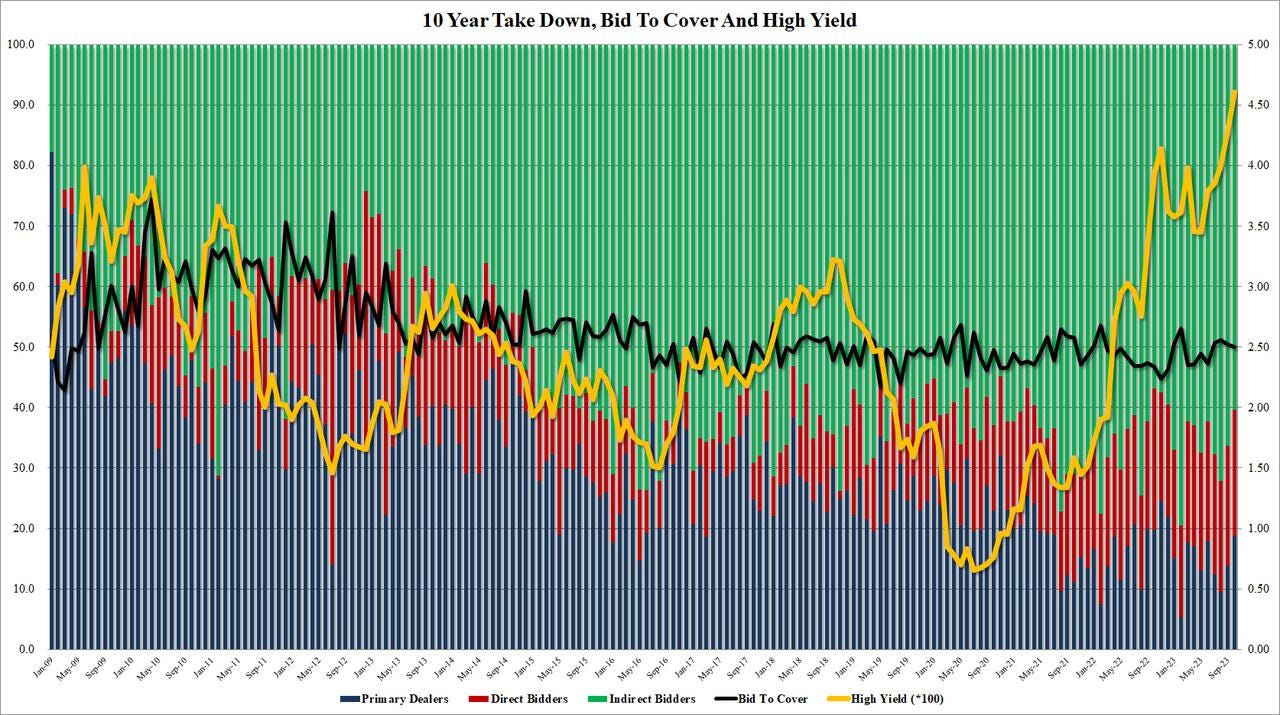Today’s headlines tell us that US banks are facing their highest write-offs since the worst part of the Covidcrash, and the shockwaves are spreading:
The largest banks in the United States are currently grappling with the worst write-offs they have experienced in three years, according to a recent report by Bloomberg. This news has sent shockwaves through the financial industry, raising concerns about the stability of the banking sector….
With mounting loan defaults and a sluggish economy, banks are being forced to write off more bad debts than they have in recent years. This trend is indicative of the financial hardships faced by both individuals and businesses in the wake of the global pandemic….
The implications of these write-offs extend beyond the banking sector. As banks tighten their lending criteria and become more cautious, it becomes harder for individuals and businesses to access credit. This, in turn, can hinder economic growth and recovery.
As a result, another story today reports U.S. bank ETFs are suffering sharp outflows ahead of reporting results. This is essentially a bet on the misery and deterioration in health those banks are going to report, causing money to flee exchange-traded bank funds ahead of the reports.
Exchange-traded funds tracking U.S. banks saw significant outflows since the start of October and ahead of earnings as investors took money off the table fearing elevated interest rates and stricter regulations in the aftermath of the regional bank crisis….
"The fundamental case for banks has certainly deteriorated over the course of the year," said Art Hogan, chief market strategist at B. Riley Wealth,… “and that is certainly illustrated by the exodus we've seen this year in some of the more popular ETFs.”
Friday will shed some light on the nation’s largest financial institutions:
JPMorgan Chase, Citigroup and Wells Fargo will kick off the quarterly earnings season for big U.S. banks on Friday.
The situation is bad enough that legendary investor Steve Eisman, who made his fast fortune during the Great Financial Crisis that put the world in the Great Recession, says today that US banks are essentially “un-investable.” He lays out a whole laundry list of reasons for that in another of today’s articles.
As the problems have spread beneath the surface of this sea of banks, a number of banks are now close to being shoved off the S&P 500.
The stock sell-off that hit regional banks this year has exposed lenders including Zions and Comerica to the risk of being delisted from the Standard & Poor’s 500 index…. That leaves the companies in a similar position to Lincoln National, which got shunted from the S&P 500 last month….
Silicon Valley Bank and First Republic were removed from the benchmark after deposit runs led to their government seizure. More changes may be coming, especially if the industry faces a protracted slump, according to analysts.
Not the best company to be keeping.
The Treasury bust, itself, has a few kinks in it today: Despite yields spiking after an ugly 10Y auction that left primary dealers stuck holding the most paper in a year, the 10-year Treasury yield on the open bond market declined, and that was despite hot wholesale inflation data that came in higher than expectations for producer prices.
The 10-year U.S. Treasury yield fell on Wednesday as investors assessed wholesale inflation data that came in hotter than expected.
That is certainly not the response one would normally anticipate, as the bond traders typically want more yield to compensate for more inflation; but perhaps it is just a continuance of the respite in bond repricing that has been happening since the war in Israel caused investors around the world to flee to US Treasuries as a safe haven.
They were also responding to Fed minutes released today that said,
A majority of participants judged that one more increase in the target federal funds rate at a future meeting would likely be appropriate, while some judged it likely that no further increases would be warranted….
Elsewhere, investors continued to consider the Israel-Hamas war that prompted many to invest in traditionally safer Treasurys earlier in the week, pushing yields lower.
So, Treasury yields fell in the general marketplace; yet they soared on the auction block for the new issuances of the 10-YR bond that governs a great many other interest rates in the country:

That’s a high that goes way back to the pre-Great-Recession days. The IMF said today, it expects inflation to stay above target through 2025, and the World Bank said the continuing high interest rates necessary to accomplish that are worrisome.
“I do think that interest rates will stay higher for longer,” the World Bank chief told reporters in the Moroccan city of Marrakech on Wednesday. “That can be a complicated event in many ways, both for investments as well as for people who over the years got used to a lower interest-rate environment.”
Expect a lot of complications for a lot longer as the Fed continues to attempt to unwind/rewind its years of huge money-minting mistakes. Both banks revised their forecasts for inflation in 2024 to be hotter than they originally thought.
“The trouble now is, because of the high rates, the high interest rates that you’ve mentioned, growth is slowing down a lot.”
Gill cited the example of the 1970s, when the Federal Reserve also durably kept rates high, and said that one lesson then was that the tightening cycle didn’t just take one or two years.
“It left about 24 economies bankrupt,” he said. “We should expect some countries to get into trouble now.”
To put it another way, years of Fed mistakes and profligacy create global crises. Nevertheless, stocks shrugged off today’s overshoot on the Producer Price Index of inflation in hopes of hearing good news tomorrow from the Consumer Price Index.
Investors will keep a close eye on the data as they search for clues on future Federal Reserve policy moves. The numbers will come a day after traders pored through hotter-than-expected wholesale inflation figures….
″[The market is] really confused right now, but I think the overall trend of PPI, CPI and today’s Fed minutes are going to push the 10-year Treasury yield higher over the coming months,” said Derek Schug, head of portfolio management at Kestra Investment Management.
Oh, I am sure you can count on that … unless the flight of capital around the world toward what is seen as the world’s greatest safe haven (outside of gold and silver for some) becomes extreme, as could happen if the war in Israel spreads. For now it is more of a precautionary flight for safety as there are no direct threats to oil and gas; but the probability of such threats has, of course, risen. So, oil prices have returned from that correction I said you could anticipate last week to rising a little this week, though the first shock has settled back down since nothing has actually happened to oil supply so far as a result of the war.
Seriously rising oil prices would, of course, cause almost all prices to rise all over the world. With two wars in major fossil-fuel producing regions raging, there is a lot of rising risk for hot inflation, too. It would be foolish to discount that, but could possible be a good time to carefully consider investing in companies that have fossil-fuel to sell … unless their sources are primarily in the Middle East, Russia or Ukraine where their oil might not escape.
If you value this writing, please take a second to support David Haggith on substack!


